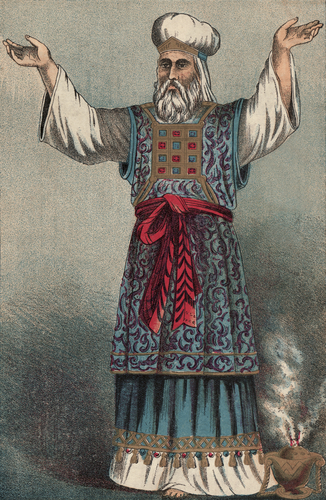Draw Near to God – James 4:8 – October 25 2021
/0 Comments/in Enduring Words for Troubled Times/by David GuzikFaithful Priest or a Failed Priest?
/0 Comments/in For Pastors, Preachers, Bible Teachers/by David GuzikDear Pastor, Preacher, or Bible Teacher –
I hope your weekend of serving God, His people, and a needy world was blessed and you have your sights set on your next opportunity. Here’s something from 1 Samuel to keep in mind as God allows you to serve Him:
Did I not choose him out of all the tribes of Israel to be My priest,
to offer upon My altar, to burn incense, and to wear an ephod before Me?
And did I not give to the house of your father
all the offerings of the children of Israel made by fire? (1 Samuel 2:28)
This passage in 1 Samuel 2 contains some of the words that a man of God brought against Eli, the high priest of Israel. In God’s word to Eli through this unknown prophet, we have a wonderful summary of some of the duties of the priesthood in Israel.

By analogy, we can learn at least two things. First, that Jesus perfectly fulfilled the priesthood in the way no one else every could. Second, these principles give a pattern of how we should serve God’s people today.
- To be My priest: First and foremost, the job of the high priest was to minister unto the Lord. Before he served the people, he was a servant of God. He was not first the people’s priest; he was first the priest of God. We first serve God.
- To offer upon My altar: The priest brought sacrifices for atonement and worship. We continually point to God’s perfect sacrifice, to what Jesus accomplished at the cross.
- To burn incense: Burning incense was a picture of prayer, because the smoke and the scent of the incense ascends to the heavens. The priest was to lead the nation in prayer, and to pray for the nation. We must be praying pastors, teachers, and leaders.
- To wear an ephod before Me: The priest was clothed in specific garments, for glory and for beauty(Exodus 28:2). He was to represent the majesty, dignity, glory, and beauty of God to the people. We need to represent our God in proper manner.
- All the offerings: The priest was also charged with the responsibility to receive the offerings of God’s people and to make good use of them. We are stewards of what God’s people give to the work of His kingdom.
Eli failed as a high priest, but Jesus perfectly fulfilled the office. As you abide in Him and reflect the heart of Jesus to those you serve, you will walk in the faith of a faithful priest, not a failed priest.
Blessings to you in Jesus’ Name – David Guzik
Click Here to Receive Email from David for Pastors, Preachers, and Bible Teachers
Grinding Teeth
/0 Comments/in Weekly Devotional/by David GuzikWhen they heard these things they were cut to the heart, and they gnashed at him with their teeth. (Acts 7:54)
This is a remarkable scene from Acts. Stephen, a servant-leader among the early Christians, was on trial before the same council that, just a few years earlier, had sent Jesus to the Romans for crucifixion. Stephen gave a remarkably eloquent and bold explanation of the council’s sin.

In response, these powerful men were cut to the heart. The council was angry because Stephen’s message hit the target. They couldn’t dismiss or ignore what he said. They were guilty of the same sins as many of their forefathers. They made an idol out of the temple, and they often rejected the deliverers God sent them. Especially, they rejected God’s ultimate Deliverer: Jesus Christ.
The Sanhedrin reacted with rage – they gnashed at him with their teeth. It is remarkable to think of this response from men who were dignified and respected leaders. This would as if a group of senators or ministers of parliament ground their teeth in anger in response to the testimony of a witness at a hearing.
According to some commentators (such as Gaebelein), the verb tenses in this sentence indicate that they did not wait until Stephen finished his speech to start grinding their teeth. It was a prolonged gnashing of teeth that lasted through all his words.
It’s not good to grind your teeth. The practice may show that someone is under a lot of stress, or lives with a lot of anger. It is a bad practice for your body, but here it was even worse as an indication of the spiritual condition of these men.
Many times in the Old Testament the gnashing of teeth describes how enemies of God’s people reacted with fury against those whom they persecuted:
They tore at me and did not cease…they gnashed at me with their teeth. (Psalm 35:16)
The wicked will see it and be grieved; he will gnash his teeth and melt away (Psalm 112:10)
All your enemies have opened their mouth against you; they hiss and gnash their teeth. (Lamentations 3:16)
In at least 5 different places in Matthew, Jesus described hell (the lake of fire) as a place of “weeping and gnashing of teeth.” So when we read, they gnashed at him with their teeth, it can’t help but remind us of the imagery of Hell.
These men were prominent, successful, and appeared to be religious; yet they rejected God and associated with hell, not heaven. The stress and anger of their rebellion against God showed itself in the grinding of their teeth.
Yet in all of this, God had His victory. Look at Psalm 37:12-13: The wicked plots against the just, and gnashes at him with his teeth. The LORD laughs at him, for He sees that his day is coming.
Today, take confidence in God’s victory – even over those who grind their teeth against Him and His people!





